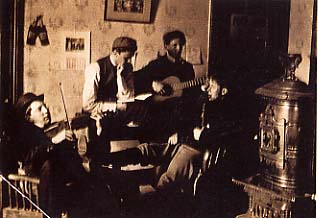|
Chi
Psi

"The
Chi Psi chapter was intended to be both of a social and literary
character. A protest on one side against the wild freaks and horseplay
to which collegians are readily disposed, and, on the other, an
intense determination to excel as studnets and wrtiers, both while
in college and in the years beyond." (Stameshkin, The Town's
College)
|
The
organization of the Alpha Mu chapter of the Chi Psi fraternity
in 1843 indicated the rise of the fraternity system at Middlebury.
In previous decades, secret fraternities began to appear on
college campuses around the country. The presence of these
secret societies as well as "local needs" facilitated
the establishment of Chi Psi and other fraternities on campus.
|
| Initially, the
Chi Psi fraternity experienced a great deal of opposition from
other students as well as from Middlebury faculty and townspeople.
As a result of the influential anti-Masonic movement of the
1830s, many faculty members feared that "fraternities would
curtail colllege control over the undergraduates" (Stameshkin,
175). To other students, Chi Psi represented a threat to the
harmony that existed on campus. In 1844 and 1845, the administration
attempted to ban fraternities from Middlebury. Thanks to the
good academic standing and strong Christian character of the
Chi Psi brothers, the fraternity was able to endure. |

|
(Bain,
The College on the Hill)
|
| The presence of
this secret society on campus continued to trouble many of the
Middlebury students. In 1844, members of the senior class assembled
to discuss the problem of the Chi Psi fraternity. Following
this meeting, several opponents of the fraternity organized
an anti-secret society movement, which "opposed the practices
of Chi Psi and corresponded with similar groups at Williams
and other colleges" (Stameshkin, 175). Ultimately, the
founding of Delta Upsilon in the 1850s brought an end to secret
societies. In 1864, a confederation of anti-secret society organizations
met at Middlebury. At this conference, the Middlebury chapter
of DU liberalized its entrance requirements and over the years
other fraternities followed their lead (Stameshkin, 176). |
|